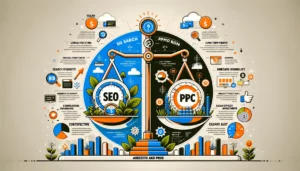Exploring Cost-Effectiveness: Is PPC Cheaper Than SEO?

In the dynamic realm of digital marketing, businesses are often faced with the dilemma of choosing between pay-per-click (PPC) advertising and search engine optimisation (SEO) for their online campaigns. While PPC offers immediate visibility and traffic, SEO promises long-term organic growth and credibility. This article delves into the cost-effectiveness of both strategies, exploring whether PPC is indeed cheaper than SEO, and how they can be strategically integrated for optimal results.
Key Takeaways
- SEO and PPC synergistically enhance visibility and credibility, proving that a combined approach is more valuable than the sum of its parts.
- Businesses must assess the pros and cons of SEO and PPC, tailoring their strategies to align with specific business goals and leveraging real-life success stories.
- Insights from PPC campaigns can significantly improve SEO efforts, leading to cost-effective content creation and more efficient keyword research.
- Understanding the Marketing Efficiency Ratio (MER) and balancing ad spend with business margins can optimise marketing budgets and yield long-term SEO savings.
- For law firms, integrating SEO and PPC is crucial to maximise digital presence, with the measurement of PPC success being essential to refine marketing strategies.
Is PPC Cheaper Than SEO? Understanding the Synergy Between SEO and PPC
The Concept of Search Incrementality
Imagine you’re running both SEO and PPC campaigns for your website. You’ve noticed that when your site appears at the top of organic search results and in the paid ads section, your credibility skyrockets. This isn’t just a coincidence; it’s the power of search incrementality at play.
Search incrementality is the added value that comes from running SEO and PPC in tandem. It’s about creating a unified front that captures attention and reinforces trust. Here’s how it works in a nutshell:
- SEO builds your organic presence, establishing a foundation of trust over time.
- PPC catapults your site to immediate visibility, targeting specific audiences or promotions.
- Together, they increase the likelihood that potential customers will click through to your site.
By leveraging both strategies, you’re not just doubling down on your efforts; you’re amplifying the impact of each.
Remember, while PPC can give you a quick win, SEO is the long game that brings sustainable growth. It’s essential to balance the two, ensuring that as your organic rankings climb, your PPC can shift focus to complement these gains. This strategic harmony is what makes the duo a cost-effective powerhouse for your digital marketing arsenal.
Credibility and Visibility: Complementary Effects
When you harness the power of both SEO and PPC, you’re not just increasing your visibility; you’re also building a foundation of credibility. Consumers tend to trust websites that appear both organically and as paid ads, a phenomenon known as ‘search incrementality.’ This dual presence reinforces your brand’s legitimacy in the eyes of potential customers.
To capitalise on this synergy, consider the following:
- Transparency and security measures on your site
- Showcasing customer testimonials and case studies
- Obtaining third-party certifications
By strategically integrating SEO and PPC, you create a cohesive narrative for your brand. This not only elevates your credibility but also ensures that your visibility translates into tangible results.
Remember, it’s not just about being seen—it’s about being recognised as a trustworthy authority in your field. Leverage customer testimonials, case studies, and certifications to solidify this trust. And don’t forget, regular publication of thought leadership content can further position your brand as an industry leader, fostering both retention and engagement.
Strategic Integration for Optimal Results
To truly harness the power of both SEO and PPC, you must view them not as rivals, but as partners in your digital marketing strategy. Strategic integration of these two approaches can lead to a sum greater than its parts, optimising your visibility and conversion rates. Consider the following steps to achieve this synergy:
- Align your SEO and PPC keyword strategies to reinforce your brand’s message across all search results.
- Use PPC data to inform your SEO content strategy, identifying high-converting keywords to target organically.
- Implement A/B testing with PPC ads to refine your SEO landing pages for better user experience and conversion.
By integrating SEO and PPC, you create a feedback loop where each informs and improves the other. This not only enhances your online presence but also provides a more cohesive experience for your potential customers.
Remember, the goal is to create a seamless journey for users from the moment they enter a search query to the point of conversion. This requires a deep understanding of your audience and the customer journey. Utilise analytics to track user behavior and adjust your strategies accordingly. The end result is a more efficient allocation of your marketing budget and a higher return on investment.
Is PPC Cheaper Than SEO? Deciphering the SEO vs. PPC Dilemma
Assessing the Pros and Cons
When you’re weighing the options between SEO and Google ads PPC, it’s crucial to consider both sides of the coin. SEO is a long-term investment, building credibility and organic reach over time, but it requires patience and consistent effort. On the flip side, PPC offers immediate visibility and can be fine-tuned for quick results, especially when managed by a skilled PPC agency.
Pros of PPC:
- Immediate visibility
- Precise targeting options
- Easy performance tracking
Cons of PPC:
- Can be costly over time
- Requires continuous investment
- May attract less engaged traffic
Pros of SEO:
- Builds long-term credibility
- Attracts more engaged traffic
- Cost-effective in the long run
Cons of SEO:
- Time-consuming to see results
- Requires ongoing adaptation
- No guaranteed rankings
Conducting a PPC audit can reveal insights into your campaign’s performance, helping to refine strategies for better ROI. Remember, the choice isn’t always clear-cut; it often depends on your business goals and market dynamics. > Balancing the immediate impact of PPC with the enduring benefits of SEO can lead to a more robust digital marketing strategy.
Tailoring Strategies to Business Goals
When it comes to digital marketing, aligning your tactics with your business objectives is paramount. Whether you’re considering Google Adwords PPC, SEO, or a combination of both, the strategy must be tailored to your unique goals. Your choice between PPC management and organic growth should hinge on the desired speed of results and the nature of your competition.
For instance, if immediate visibility is crucial for a product launch, PPC might be your go-to. A PPC ad agency can swiftly position your brand at the top of search results, albeit at a cost. On the other hand, if you’re aiming for sustainable growth, investing in SEO could yield a higher return over time. eCommerce businesses, in particular, can benefit from a specialised PPC eCommerce agency that understands the nuances of online retail.
- Assess your market and competition
- Define clear business objectives
- Choose the right mix of SEO and PPC
By meticulously planning your approach, you can ensure that every dollar spent contributes directly to your business milestones. Remember, there’s no one-size-fits-all solution; what works for one may not work for another. Stay agile, and don’t hesitate to seek expert advice from a PPC ad agency or an eCommerce ppc specialist to navigate the complexities of digital marketing.
Real-Life Success Stories
When you’re weighing the merits of PPC against SEO, real-world examples can be incredibly illuminating. Zendesk, for instance, has woven customer success into the very fabric of its marketing strategy. By ensuring clients can effectively utilise their services, Zendesk has seen retention soar and organic growth through positive testimonials and case studies.
Salesforce is another testament to the power of customer-centric marketing. Their investment in customer success, including comprehensive onboarding and continuous education, has not only fostered loyalty but also turned users into brand ambassadors, contributing to a robust and self-sustaining marketing ecosystem.
By focusing on customer success, these companies have not just optimised their marketing spend but also created a ripple effect of organic advocacy that no paid advertising can match.
Consider implementing these actionable tips to emulate their success:
- Personalise your onboarding process to help customers achieve their goals.
- Schedule regular check-ins and provide user training sessions.
- Maintain a responsive support team to enhance customer satisfaction.
- Integrate customer success stories into your marketing materials.
- Create referral programs that reward customers for sharing their positive experiences.
Is PPC Cheaper Than SEO? Enhancing SEO with Insights from PPC
Cost-Effective Content Creation
When you’re aiming to maximise the impact of every dollar spent, understanding how PPC can inform content creation is crucial. Leverage PPC campaign data to pinpoint what resonates with your audience, tailoring your content strategy to reflect these insights. This approach not only enhances relevance but also increases the likelihood of conversion, making your content marketing efforts more cost-effective.
By analysing the performance of various PPC ads, you can identify themes and topics that garner the most engagement. Use this data to inform your editorial calendar, ensuring that your content addresses the interests and pain points of your target demographic.
Keyword Research Efficiency
When you delve into PPC, you’re investing in real-time market research. The performance data from your PPC campaigns is a goldmine for SEO keyword research. By analyzing which keywords are driving conversions in your paid ads, you can prioritise these for your organic content strategy, ensuring you focus on terms that are proven to resonate with your audience.
Keyword research tools for PPC, like Google Ads Keyword Planner, provide immediate feedback on the search volume and competition for specific keywords. This data is invaluable for SEO because it allows you to make informed decisions about which keywords to target for long-term organic growth.
By integrating PPC keyword insights into your SEO efforts, you’re not just guessing which keywords might perform well; you’re applying concrete data to enhance your content’s visibility and relevance.
Consider the following steps to maximise keyword research efficiency:
- Start with PPC data to identify high-converting keywords.
- Use SEO tools to analyse the broader potential of these keywords.
- Refine your keyword list by incorporating search intent and relevance.
- Implement negative keywords to filter out unqualified traffic.
- Continuously monitor and adjust your keyword strategy based on performance metrics.
Landing Page Optimisation
Your landing page is the pivotal point where interest transforms into action. It’s where the true test of your PPC campaign’s effectiveness lies. To ensure your landing page is conversion-worthy, consider these essential elements:
- Relevant, eye-catching headlines
- Clear, enticing call-to-action (CTA)
- Original, high-quality visuals
- Intuitive, easy-to-navigate design
- Simple, spam-resistant forms
- Seamless alignment with your PPC ads
- Social proof or testimonials
- Contact information
- Social share buttons
- Quick load time
- Optimised for mobile navigation
Remember, the most profitable landing pages are often minimalist in design, with a straightforward CTA, eliminating any confusion for the visitor. > Your landing page should not only resonate with the ad that led the visitor there but also encourage them to take the next step with utmost clarity and ease.
By leveraging insights from your PPC campaigns, you can refine your landing pages to better meet the needs of your potential clients. This is especially true for law firms, where the stakes are high and the competition is fierce. A well-optimised landing page can make the difference between a prospect and a new client. So, take the time to test, adjust, and perfect your landing pages. The effort will pay dividends in the form of higher conversion rates and a stronger return on investment.
Is PPC Cheaper Than SEO? Optimising Your Marketing Budget
Understanding the Marketing Efficiency Ratio (MER)
When you’re diving into the depths of digital marketing, grasping the concept of the Marketing Efficiency Ratio (MER) is crucial. MER is a powerful metric that measures the return on investment for your marketing campaigns. It’s calculated by dividing the revenue generated from your marketing efforts by the cost of those efforts. This ratio provides a clear picture of how effectively your marketing budget is being utilised.
To truly optimise your marketing budget, consider the following points:
- Evaluate the MER regularly to ensure your marketing strategies are cost-effective.
- Adjust your campaigns based on MER insights to improve efficiency.
- Aim for a higher MER to indicate better utilisation of your marketing spend.
By consistently monitoring and refining your MER, you can make informed decisions that enhance the profitability and sustainability of your marketing initiatives. Remember, a successful strategy is not set in stone; it evolves with market trends and consumer behavior.
Balancing Ad Spend with Business Margins
When you’re navigating the complex world of digital marketing, understanding how to balance your ad spend with your business margins is crucial. You must ensure that every dollar spent on campaigns is an investment, not a cost. To achieve this, consider conducting a Google ads audit to evaluate the performance of your campaigns against your financial goals.
- Review your current ad spend and compare it with the revenue generated.
- Analyse the cost-per-click (CPC) and conversion rates to determine the efficiency of your ads.
- Adjust your bids and budgets based on the insights gained to optimise for profitability.
Remember, the goal is not just to drive traffic but to attract conversions that contribute positively to your bottom line. Partnering with reputable Google ads agencies or Google advertising agencies can provide you with the expertise needed to fine-tune your campaigns for maximum efficiency.
By meticulously analysing your marketing efficiency ratio (MER) and aligning your PPC strategies with your business margins, you can create a sustainable model for growth. This approach ensures that your marketing efforts are not only cost-effective but also scalable, allowing you to reinvest in areas that show the most promise.
Long-Term Savings with SEO
When you invest in SEO, you’re planting seeds for future growth. Unlike PPC, where costs are incurred with each click, SEO builds a foundation that continues to drive traffic without additional expense. The compounding effect of SEO efforts means that the work you do today will continue to pay dividends in the future, often resulting in a significant reduction in cost per acquisition over time.
SEO is not just about being cost-effective; it’s about sustainability. With each piece of optimised content, every backlink secured, and each technical tweak, you’re enhancing your site’s ability to attract organic traffic. This traffic is not just a one-time spike; it’s consistent and grows as your SEO efforts compound. Here’s what you can expect with a well-executed SEO strategy:
- Long-term results: Your site remains visible and competitive with consistent SEO efforts.
- Compounding returns: SEO builds on itself, increasing visibility and traffic over time.
- Cost-effective: Organic traffic flows without ongoing ad spend, making SEO a sustainable long-term strategy.
- Brand awareness: High search engine rankings boost visibility and credibility.
Remember, while SEO takes time to mature, the long-term savings are undeniable. By reducing reliance on paid search, you’re not just saving money; you’re building an asset that will continue to attract visitors for years to come.
Is PPC Cheaper Than SEO? The Impact of Digital Marketing on Law Firms
Is PPC More Beneficial for Law Firms?
When you’re considering the digital marketing strategy for your law firm, you might be weighing the benefits of PPC against SEO. While SEO offers long-term growth and credibility, PPC can provide immediate results and granular targeting options. A London PPC agency could be instrumental in navigating the competitive legal landscape, especially when immediate visibility is crucial for client acquisition.
PPC advertising works well when advertisers want visitors to their sites, but it’s a less accurate measurement for advertisers looking to build brand awareness. This is particularly relevant for law firms where establishing trust and expertise is paramount.
It’s essential to understand that PPC isn’t just about clicks; it’s about converting those clicks into clients. A strategic approach to PPC can complement your SEO efforts, ensuring that your firm is visible to those in immediate need of legal services.
To optimise your PPC campaigns, consider these points:
- Define clear objectives for your campaign.
- Target the right keywords that potential clients are using.
- Continuously analyse and adjust your bids for better ROI.
Remember, the ideal PPC spending for a law firm should align with your overall marketing budget and business goals. It’s not about outspending competitors, but outsmarting them with a well-crafted campaign.
Is PPC Cheaper Than SEO? Measuring PPC Success in the Legal Industry
When you delve into the realm of PPC for your law firm, understanding the metrics that spell success is crucial. Your cost per new client, return on ad spend (ROAS), and profits per new case are the cornerstones of a successful campaign. These figures not only reflect the effectiveness of your PPC efforts but also align with the ultimate goal of your firm: growth and profitability.
Conversion rate and average revenue per case are also significant indicators. They provide insights into how well your ads resonate with potential clients and the value they bring to your firm. To truly grasp the impact of your PPC campaigns, consider the following:
- The geographic location of your firm and its influence on ad performance
- Willingness to invest in new leads
- Website conversion rates
- Competitor ad performance
Remember, a PPC campaign’s success isn’t just about the number of clicks or impressions. It’s about the quality of those interactions and their conversion into tangible business outcomes.
To tailor your PPC strategy effectively, it’s essential to analyse these metrics regularly. Partnering with a specialised PPC agency can provide the expertise needed to navigate this complex landscape and optimise your campaigns for maximum return.
Leveraging SEO and PPC for Competitive Advantage
To truly excel in the digital marketing arena, you must recognise the unique strengths of both SEO and PPC. By strategically combining these tactics, you can amplify your online presence and drive more meaningful results. For instance, while SEO builds a solid foundation for long-term visibility, PPC can provide immediate traffic and feedback on keyword performance.
- Use PPC to test and refine your SEO strategies, ensuring that your content resonates with your target audience.
- Employ the insights from PPC ad performance to enhance your SEO content, making it more compelling and conversion-focused.
- Optimise your landing pages for both organic and paid search, creating a cohesive user experience that boosts both credibility and conversions.
By integrating SEO and PPC, you not only increase your reach but also create a synergy that can lead to a significant competitive edge. This strategic fusion allows for a more data-driven approach to content creation and audience targeting, ultimately resulting in a more cost-effective and impactful marketing campaign.
Remember, the goal is not to choose between SEO and PPC, but to find the right balance that aligns with your business objectives and market dynamics. By doing so, you can leverage the incrementality of search to your advantage, ensuring that each dollar spent is an investment towards sustainable growth.
Is PPC Cheaper Than SEO? Conclusion
In the quest to determine whether PPC is truly cheaper than SEO, it’s clear that both strategies hold their unique value and serve different purposes within a digital marketing plan. PPC offers the immediacy and precision targeting that can jumpstart a campaign and provide quick insights, while SEO builds a sustainable, cost-effective foundation for long-term success. The synergy of PPC and SEO working in tandem often yields results greater than their individual contributions, enhancing credibility and maximising online presence. For businesses, the key takeaway is to assess their marketing efficiency ratio, align strategies with business goals, and leverage the strengths of both PPC and SEO for a comprehensive, dynamic approach to digital marketing.
Frequently Asked Questions
Is PPC cheaper than SEO?
The cost-effectiveness of PPC compared to SEO can vary based on several factors, including the competitiveness of the industry, the target keywords, and the specific goals of the marketing campaign. PPC offers quick results and precise targeting at a cost, while SEO requires a longer-term investment but can lead to more sustainable and cost-effective results in the long run.
What is ‘search incrementality’ and how does it relate to SEO and PPC?
Search incrementality refers to the added value that arises when SEO and PPC strategies are used together. When consumers see a website both at the top of organic search results and in paid ads, they tend to perceive the brand as more credible. The synergy between SEO and PPC can lead to greater overall effectiveness than either strategy alone.
How should a business decide between focusing on SEO or PPC?
Deciding whether to focus on SEO or PPC should be based on the business’s specific goals, budget, and timeline. SEO is a long-term strategy that builds organic growth, while PPC offers immediate visibility and traffic. A balanced approach often yields the best results, tailoring the strategy to leverage the strengths of both SEO and PPC.
How can PPC ad copy enhance SEO content?
PPC ad copy can provide insights into what messaging and keywords resonate with the target audience. By analysing which PPC ads lead to the most conversions, businesses can inform their SEO content strategy, optimising title tags, meta descriptions, and content to align with successful PPC campaigns.
What is the Marketing Efficiency Ratio (MER) and how does it relate to PPC and SEO?
The Marketing Efficiency Ratio (MER) is a metric that helps assess the profitability of paid ad spend based on business margins. By understanding the MER, businesses can determine how much they can afford to spend on PPC without negatively impacting their bottom line. This understanding can help optimise the marketing budget and create a synergy between PPC and SEO efforts.
Is PPC more beneficial than SEO for law firms?
For law firms, both PPC and SEO are crucial for enhancing digital presence. PPC can provide immediate visibility and lead generation, while SEO builds a foundation for long-term organic growth. The most effective digital marketing strategy for law firms often involves using both PPC and SEO to complement each other and maximise overall performance.
Author
Search Blog
Free PPC Audit
Subscribe to our Newsletter
The Voices of Our Success: Your Words, Our Pride
Don't just take our word for it. With over 100+ five-star reviews, we let our work-and our satisfied clients-speak for us.
"We have been working with PPC Geeks for around 6 months and have found Mark and the team to be very impressive. Having worked with a few companies in this and similar sectors, I rate PPC Geeks as the strongest I have come across. They have taken time to understand our business, our market and competitors and supported us to devise a strategy to generate business. I value the expertise Mark and his team provide and trust them to make the best recommendations for the long-term."
~ Just Go, Alasdair Anderson




